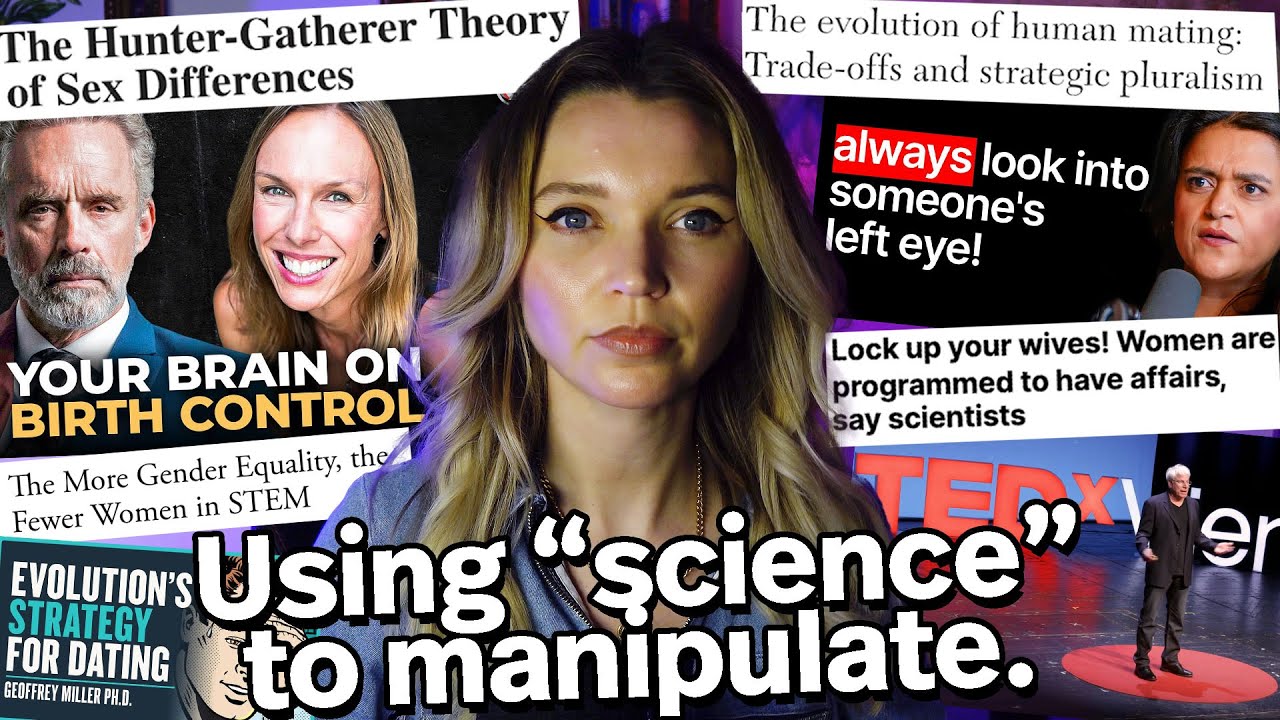Edit - Addendum: The video title is quite clickbait-y. The video doesn’t want to debunk any “serious” science, but rather investigates how badly done research with no reproducability or horrible statistical significance is used to influence the discourse in favour of regressive politics.



You still critizised a video without watching it. That’s as close to judging a book by its’ cover as you can get.
As stated before, I watched the beginning, end, and various samples from the center.
You can not invalidate criticism by publishing a N-hour video and complaining that the critics didn’t watch every second.
Let’s switch perspective for a moment: if I publish a 24-hour video titled “I debunked classical mechanics” and talked about journalism during 23 hours of it, I should not be able to deflect criticism with the claim that “you didn’t watch all of it”.
Part of my criticism is inability to come up with short and falsifiable points. Public communication about science pretty much requires doing that. Already in my first post, I mentioned that I thought the video was needlessly long.
And yes, I’m not a fan of misleading people. When I see someone doing that, yes, I will criticize.
I’d claim that your samples aren’t enough to make anything about the contents of the video. You could claim that the title is misleading, but you clearly don’t have enough context to judge the video.
It’s a video essay, you act like you watched scenes from the Lord of the Rings trilogy and concurred that the firms are too long to convey the story.
You’re constantly ignoring that a field has a societal context. Evopsych books didn’t fall from the sky. The field has active members and the cultural impact is what’s being judged here.
You could have just stayed silent, if you don’t have anything valid to add, instead of mansplaining us to death.
Yes, my mistake was to think that people might benefit from pointing out problems with the information sources they consume. In reality, people get defensive, especially if an outsider comes to criticize (also a pattern which evolutionary psychology helps understand).
You didn’t point out jack shit, as you didn’t know any of the so-called “problems”, but rather assumed before you started mansplaining.
Also: isn’t that exactly what you did? Someone points out problems with evopsych and you got defensive?
Yeah, I call bullshit. That statement alone is ample example of all the bullshit flying around in evolutionary psychology.
BTW: Earlier you wrote
I call bullshit again. You stated earlier that eugenics would work if we knew the “good” from the “bad” genes and called it more euphemistically. That’s exactly the bullshit that the video calls out… once again.
Someone claimed that they had “debunked” evolutionary psychology. I pointed out that it has quite a firm footing - nobody is doubting that evolution can produce psychological traits, and psychological traits can have evolutionary value.
So, the maximum effect to which one can “debunk” that branch of biology / psychology, is pointing out that “people are doing it wrong”, and “people are understanding it wrong”.
My comparison: I publish a video where I “debunk classical mechanics”. In the video, I complain about mechanical problems with all sorts of products, point out that bridges can collapse (and indeed sometimes do), walls crack, cars are dangerous to crash at high speed, and that braking is difficult for roller skaters. Despite listing a whole slew of problems in applied mechanics, and despite having brought examples of people not getting their mechanics right… I have debunked nothing. Textbooks need not be altered.
This video accomplishes pretty much the same. I understand why it was made, but I would have made it very differently - and would have made it much shorter.
Actually, it is not. Willingness to trust outsiders and deal with them has an evolutionary aspect. Everyone’s ancestors have needed to address this in their evolutionary past. Results have influenced their evolutionary success. An outsider could bring useful techniques or information, but could also bring a disease against which locals had no immunity, or take back information and bring about hostile interest. Determination of who to consider an outsider is moderated by rational thought and culture, but willingness to risk is also influenced by genes. So, even today, we are influenced - sometimes for good and sometimes for ill - by psychological traits which enabled some of our ancestors to make better / worse decisions in their environment. To make better decisions for ourselves, we should keep that in mind.
I chose my example for a reason. It is not bullshit at all. Building a grand palace of superstructure onto this little bit of understanding, that would be bullshit. To apply knowledge, one must know approximately where it ends. A fool doesn’t and builds grand palaces onto one brick.
Here, please read again. My words:
From this paragraph, I expect a reader to understand (if they are willing) that I consider eugenics to deserve a prefix of “pseudo”, that is, I consider it a pseudoscience. I bring another example of such a science. I also point out that eugenicists attempted to fix problems which they did not understand.
In this paragraph, I make two main statements. I note down that eugenics took a character of repression and discrimination. But I point out that the goal of either fixing / improving genes or neutralizing the effect of bad ones - that didn’t die with eugenics. People started understanding better. In these days, nobody wants to touch the world “eugenics” with a six foot pole, but genetically modified crops are growing on fields, and some patients are even receiving gene therapy. Databases are being compiled to detect genetic predisposition to illness or give personalized suggestions for treatment. I too have donated my genome for research to a local university, and I expect to learn some day what my genetic risk profile is - so that I could behave accordingly and avoid illness.
Then I proceed to explain why evolutionary psychology, behavioural ecology and game theory are extremely unlikely to end up in the rubbish bin where eugenics landed. And I fully stand by my opinion. :)
Repeating your point dosn’t make it less wrong. You didn’t watch the video. You don’t get to judge it.
Please show the scientific process went in establishing that mistrust of strangers is a genetically evolved trait. That’s one of the biggest problems of evopsych: basically all theories are post-hoc. That’s not science, it’s wild speculation with a bunch of unfalsifiable claims.
Are you seriously comparing the breeding of crops with the human genome? Analysing the human genome is not the same as eugenics with a less burned name. The whole idea of eugenics is to make the human gene pool more shallow in favour of more “advantageous” traits/genes.and that doesn’t work, no matter how well the human genome is understood.
Also: nobody mentioned game theory or behavioral ecology, but you. Adting as if they were ever under attack by this video is mansplaining an best and strawmanning at worst.
Those are quite closely related branches of research. If you deal with one, you’re almost certainly also involved with another, so much that teaching them on the same course makes sense. Human psychology is considerably more complex than animal psychology, but built of the same blocks - and both humans and animals can, to different degrees, be rational agents in natural or artificial games, where their choice of strategy depends on their psychological profile.
Here are some articles on the subject. The deepest-drilling article is not about humans, but dogs.
“Genetic mapping of canine fear and aggression”
So it seems that in dogs, there likely is a genetic factor involved in fear of unfamiliar individuals and agression towards them. It is no wonder, as countless generations of wolves have likely needed to decide how to relate to an individual from another pack, and this has sometimes conveyed them advantages or disadvantages.
Large Study Identifies Genetic Variants Linked to Risk Tolerance and Risky Behaviors
So it seems that in humans, there are hundreds (or thousands) of genes subtly influencing different types of risk-and-reward calculations. Trust (or distrust) in strangers is a narrower part of a wider array of attributes which can be summarized as “risk tolerance”. It has been noticed recently that genetic factors contribute, along with environmental factors, of course. It is worth noting that genetic factors aren’t considered to be the biggest source of influence.
…and in practise, a person knowing about their genetic predisposition might apply this knowledge in related fields - e.g. when negotiating a risky deal, deciding whether to litigate or take retribution after being wronged, deciding whether to wear a life vest or attach a seatbelt.
Some person might know of their predisposition to seeking higher reward at high risk, and refrain from gambling. Another might know that their reward-seeking mechanisms are more susceptible than usual to chemical addiction, and avoid consuming certain substances. Another might know of their predisposition to averting loss, even if it also averts gain, and deliberately increase their willingness to take business risk. Another might want to compensate against their higher tendency to distrust strangers, or against a tendency to trust too easily.
Yes. All life on Earth is related. Even plants and bacteria use the same sort of ribosomes to make their protein, and most air-breathers use the same sort of mitochondria to process oxygen. Altering plants so they would resist drought or flooding better is only some degree of knowledge away from giving oneself or others night vision, ability to heal bigger wounds, greater resistance to cancer or inability to get thrombosis.
Not hastily, though, as genomes don’t have their goods in clearly labeled boxes.
I stand by my statement that you are one of the people who would have learned the most from the video.